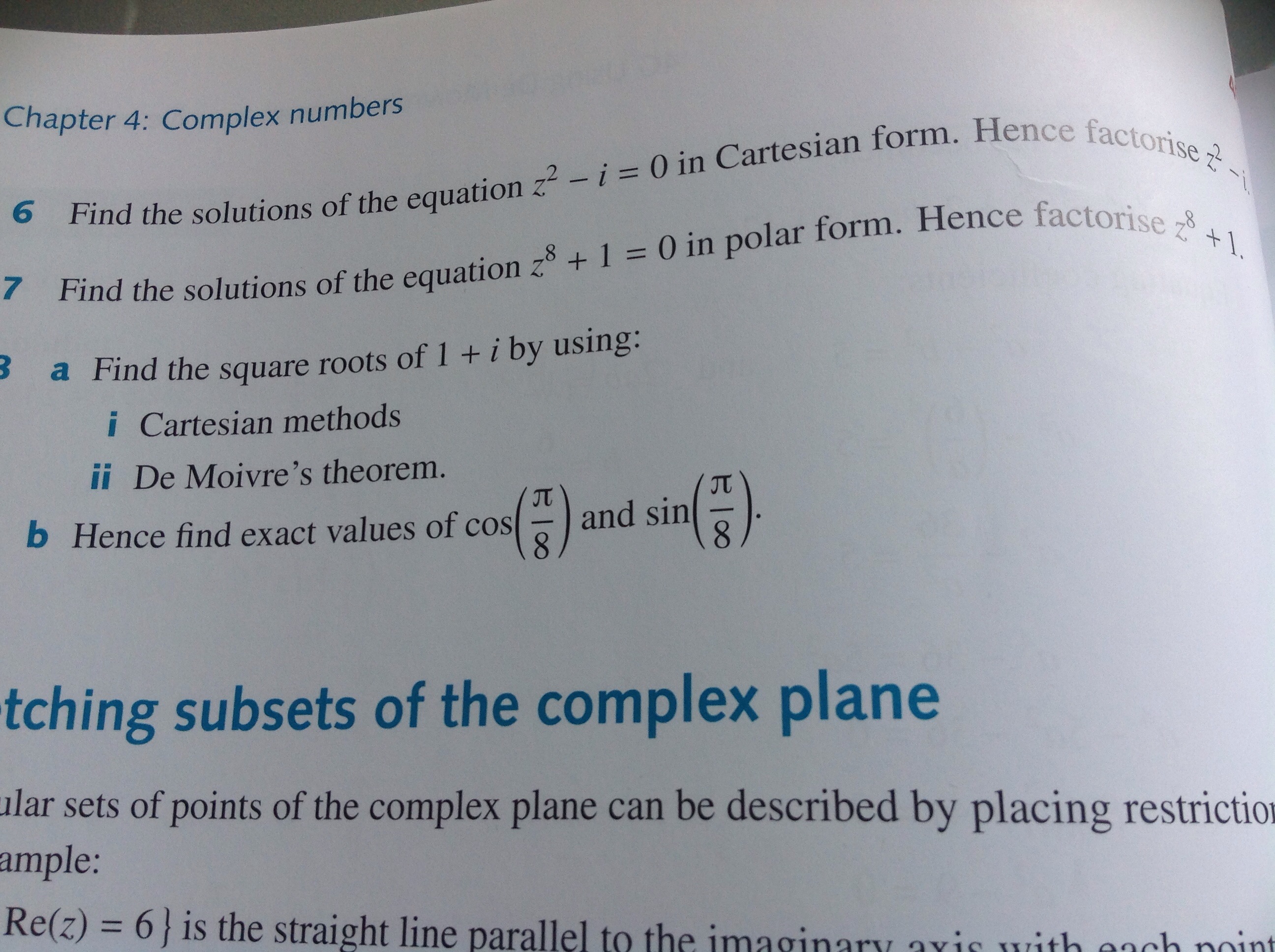Given:
z^2-i=0z2−i=0
z=x+iyz=x+iy
z^2=(x+iy)^2z2=(x+iy)2
z^2=x^2+2ixy+(iy)^2z2=x2+2ixy+(iy)2
i^2=-1i2=−1
z^2=(x^2-y^2)+2ixyz2=(x2−y2)+2ixy
substituting for z^2
(x^2-y^2)+2ixy-i=0(x2−y2)+2ixy−i=0
(x^2-y^2)+(2xy-1)i=0+0i(x2−y2)+(2xy−1)i=0+0i
Equating the real and imaginary parts
x^2-y^2=0x2−y2=0
2xy-1=02xy−1=0
2xy=12xy=1
y=1/(2x)y=12x
x^2-(1/(2x))^2=0x2−(12x)2=0
x^2-1/(4x^2)=0x2−14x2=0
Let
t=x^2t=x2
t-1/(4t)=0t−14t=0
4t^2-1=04t2−1=0
4t^2=14t2=1
t^2=1/4t2=14
t=+-1/2t=±12
t=1/2t=12
t=-1/2t=−12
ie
x^2=1/2x2=12
x=+-1/sqrt2x=±1√2
x=1/sqrt2x=1√2
x=-1/sqrt2x=−1√2
x^2=-1/2x2=−12
x=+-i/sqrt2x=±i√2
x=i/sqrt2x=i√2
x=-i/sqrt2x=−i√2
Thus,
Substituting for x,
x=1/sqrt2 , x=1√2,
y=1/(2x)=1/(2xx1/sqrt2)y=12x=12×1√2
y=1/sqrt2y=1√2
x=-1/sqrt2 , x=−1√2,
y=1/(2x)=1/(2xx-1/sqrt2)y=12x=12×−1√2
y=-1/sqrt2y=−1√2
x=i/sqrt2 , x=i√2,
y=1/(2x)=1/(2xxi/sqrt2)y=12x=12×i√2
y=-i/sqrt2y=−i√2
x=-i/sqrt2 , x=−i√2,
y=1/(2x)=1/(2xx-i/sqrt2)y=12x=12×−i√2
y=i/sqrt2y=i√2
We have
(1/sqrt2,1/sqrt2)(1√2,1√2)
(-1/sqrt2,-1/sqrt2)(−1√2,−1√2)
(i/sqrt2,-i/sqrt2)(i√2,−i√2)
(-i/sqrt2,i/sqrt2)(−i√2,i√2)
as solutions
z=1/sqrt2+1/sqrt2iz=1√2+1√2i
z=-1/sqrt2+-1/sqrt2iz=−1√2±1√2i
z=i/sqrt2+1/sqrt2z=i√2+1√2
z=-i/sqrt2-1/sqrt2z=−i√2−1√2
Rearranging
z=1/sqrt2+i/sqrt2z=1√2+i√2
z=-1/sqrt2-i/sqrt2z=−1√2−i√2
z=1/sqrt2+i/sqrt2z=1√2+i√2
z=-1/sqrt2-i/sqrt2z=−1√2−i√2



